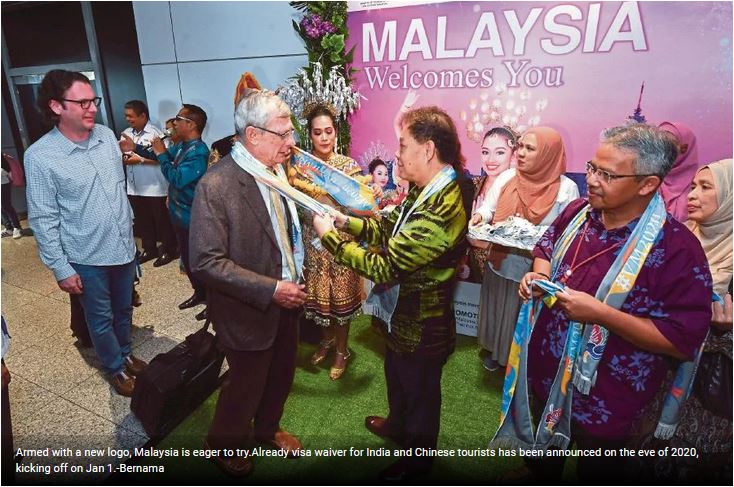Visit Malaysia Year 2020 is more than a numbers game
Emeritus Professor Tan Sri Dato' Dzulkifli Abdul Razak
Opinion - New Straits Times
January 4, 2020
2020 is Visit Malaysia Year (VMY2020). Our slogan is ‘Malaysia Truly Asia’.The ‘Truly Asia’ destination that is at the heart of Asean.
VMY2020 aims to garner 30 million visitors amid a sliding number that is worrying of late. Armed with a new logo, Malaysia is eager to try.Already visa waiver for India and Chinese tourists has been announced on the eve of 2020, kicking off on Jan 1.
This is the fifth edition of VMY with a budget of RM1.1 billion for the ministry of tourism, arts and culture, including an allocation of RM960 million to drive awareness, promotions and programmes of the VMY2020 campaign.
While many eagerly await the visa-free travellers, Lithuania share one of its most recent disturbing experiences. As reported on Dec 29, Lithuania’s Hill of Crosses, the country’s top religious heritage which has been a place of pilgrimage for centuries, was vandalised, allegedly by a Chinese tourist.
After tossing the cross away, the culprit was reported to have blurted: ‘We have done a good thing today. Our motherland is great.’A photo dated November was posted online showing graffiti on another that crudely reads:’Hope all cockroaches soon rest in peace. Hope HK can return to peace.’
The Lithuanian minister of foreign affairs remarked on social media that such an incident was a ‘shameful, disgraceful act of vandalism under investigation by authorities. Such behaviour can’t and won’t be tolerated’.
The tragic incidences are evident enough to show how disrespectful some tourists can be towards the culture of others. They have no qualms to do what they fancy, as though it is their ‘motherland’.
To make matters worse, the so-called ‘motherland’ is often in a state of denial, regardless of how despicable the actions of her citizens overseas! And to date, there are plenty to share.
For example, other sources claimed the purging of politically incorrect materials, like pro-democracy books and religious texts wholly blamed for the ‘extreme’ situations existing today. Some recalled the bitter experiences of the Chinese Cultural Revolution of the 1960s, if not that of German Nazi-era.
Of late, we read (NST, Dec 26) the outrage expressed over a report alleging “comprehensive evaluation of the existing religious classics aiming at contents that do not conform to the progress of the times”, pointing out to a November consultative conference in China.
Quoting Xinhua News Agency, a group of 16 experts, believers and representatives of different religions from the Central Committee of the Communist Party of China attended the conference, supervised by the chairman of the Chinese People’s Political Consultative Conference.
The report outlined China’s recent policy move that all translated classic religious books should be ‘re-evaluated’; the new editions must not contain content that contradicts socialism and paragraphs deemed wrong by censors will be amended or re-translated.
The move is seen as an attempt towards ‘sinicisation’ to eliminate contents that contradict ‘the core values of socialism’ and to build a ‘religious system with Chinese characteristics’.
Such obsession for all things Chinese amply explains the vandalism in Lithuania and other parts of the world. Malaysia is not spared in this respect.
One is reminded, in early 2018, of a news item in Sabah citing Beijing’s special identity card for its diaspora overseas directed to those born in China and had become Malaysians.
This was in response to the then rumours that the issuance of such a card could trigger mass emigration of ethnic Chinese in Malaysia back to mainland China.
‘There are those born in China but chose to migrate to Malaysia and acquired Malaysian citizenship. So these cards are for them to go back if they want to,’ according to the source.
This was substantiated by a Hong Kong-based news site reaffirming that China would be implementing the card system for overseas Chinese, including those in Southeast Asia.
Apparently, the programme was expected to attract overseas Chinese back to China.
So welcome to VMY2020 with the prospect that goes beyond just numbers of inbound tourists, thanks to the visa waiver.
The writer, an NST columnist for more than 20 years, is International Islamic University Malaysia rector

